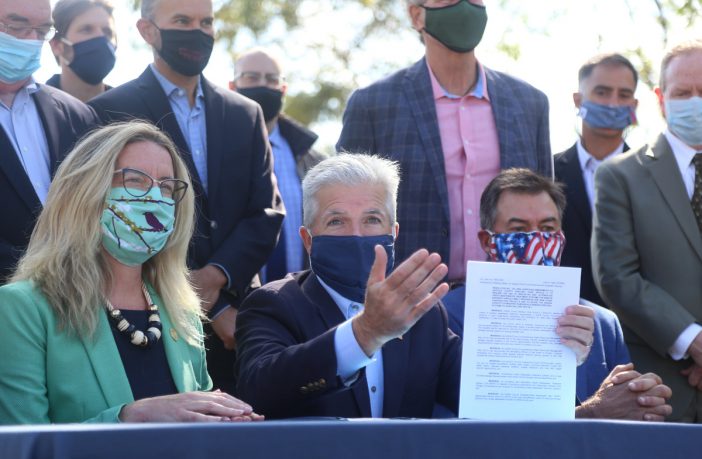Suffolk County Executive Steve Bellone has signed historic legislation that will enact strong new protections for water quality by reducing pollution from outdated cesspools and septic systems. The bill, which was unanimously passed by the County Legislature on October 6th, modifies the County’s Sanitary Code to require the use of nitrogen-reducing wastewater technologies in unsewered areas of the county for all new construction and also allows greater flexibility for the use of small sewer plants in downtown business districts. The changes are part of an overall plan to address the longstanding problems resulting from the lack of sewer infrastructure in most of the County.
“Protecting water quality is a top priority for both our region’s environment and our economy,” said Suffolk County Executive Bellone. “The actions we take today will allow for greater investment in our downtown business districts and help to ensure that future generations will be able to enjoy cleaner water in the bays, harbors and beaches that make Suffolk County such a special place. This legislation is a historic step towards a more sustainable and healthy environment.”
Suffolk County Presiding Officer Rob Calarco said: “This is a significant moment that will improve the lives of generations to come in Suffolk County. We are an island community that relies on a sole source aquifer system for our drinking water, and it is critical that we as leaders remain forward thinking in our efforts to protect this precious resource. These new requirements will help improve the health of our waters and at the same time will protect the marine and tourism industries that boost our local economy. I am proud of my colleagues in the legislature for offering their unanimous support for this bill, and I thank the County Executive and his team for ensuring that protecting our water quality remains a priority.”
Suffolk County Legislator Tom Cilmi, Republican Minority Leader, said: “There is no debate that reducing nitrogen from failing cesspools is a good thing for our drinking water and for our surface waters. There is likewise no debate that our quality of life here in Suffolk County is dependent in so many ways on water quality. That’s why I was proud to work with the County Executive’s office, Legislative colleagues on both sides of the aisle and stakeholders, to find common ground which ultimately led to unanimous support for this important legislation.”
Advanced systems will be required in all new home and commercial construction, and for single family home renovations that increase the number of bedrooms to more than five and increase the building’s footprint or floor area. The new requirements take effect in July of 2021. The bill also provides greater flexibility for the use of smaller sewage treatment plants, a change intended to assist businesses that rely on cesspools to shift to systems that reduce nitrogen instead, allowing expansion of uses while better protecting water quality.
While the new law represents a major milestone in the advancement of water quality across the County, it is only the latest in a series of historic actions the County has taken in recent years to move away from the use of cesspools and septic systems that have been identified as a primary source of nitrogen pollution. In 2016, Suffolk County established Article 19 of the Suffolk County Sanitary Code, which sets forth the most rigorous individual nitrogen reducing septic systems (I/A OWTS) testing and approval process in the United States. Article 19 also establishes the County’s Department of Health Services as the Responsible Management Entity (RME) to oversee the approval, installation, permitting, and performance of all I/A OWTS.
In 2017, Suffolk County unveiled the Septic Improvement Program, the first of its kind in New York State, which provides grants and low interest financing to make the replacement of cesspools and septic systems with new IA technologies affordable for homeowners who choose to upgrade their systems. To date, more than 1,900 homeowners have applied for the program, resulting in the issuance 1,082 grants. Nearly 600 IA systems have been installed under the grant program. The success of the program has received statewide recognition, as New York State awarded Suffolk $10 million or almost 70 percent of the entire $15 million in State Septic System Replacement Funds distributed statewide in 2018. A second award of State funding is expected in early 2021.
Nearly three years ago, at the same site, County Executive Bellone signed a landmark Cesspool Ban into law. This legislation banned the installation of new cesspools in Suffolk County, closing a loophole that had existed in the Sanitary Code since 1973, and required “grandfathered” business properties to install nitrogen reducing advanced systems.
Today’s changes build on the actions taken three years ago, and the new legislation signed into law is the first policy change being advanced based on recommendations in the County’s 2019 Subwatersheds Wastewater Plan. The Suffolk County Subwatersheds Wastewater Plan determined that the use of I/A OWTS is the most cost-effective means of reducing nitrogen pollution from onsite wastewater sources in Suffolk County
Bellone was joined at the bill signing by representatives of the business and environmental communities, demonstrating the broad support for the County Executive’s Reclaim Our Water initiative, which is built on a collaborative effort involving USEPA, the New York State Department of Environmental Conservation, the New York State Center for Clean Water Technology at Stony Brook University, and town and village governments.
“For the first time in history, government agencies on all levels, our outstanding academic institutions, and the business and environmental communities are all working together to solve the difficult problems that have resulted from the lack of sewer infrastructure in most of Suffolk County,” noted the County Executive. “Protecting water quality is a necessity for a sustainable economy in a region that relies on its bays and harbors to support its tourism economy. This new law is an important step forward in that process.”











